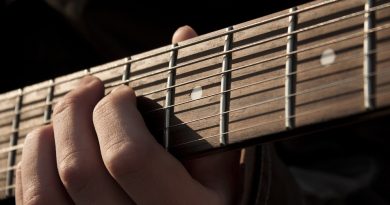Mastering Chord Construction: A Beginner’s Guide to Guitar
Mastering Chord Construction: A Beginner’s Guide to Guitar
As a beginner guitarist, understanding how chords are constructed is essential to becoming proficient at playing the guitar. Chords are the building blocks of music, and mastering chord construction will help you play a variety of songs and improve your overall musical skills. In this guide, we will walk you through the basics of chord construction and provide tips on how to efficiently practice and master this essential skill.
Understanding Basic Music Theory
Before we dive into chord construction, it’s important to have a basic understanding of music theory. Chords are made up of three or more notes played together, and each note is assigned a different pitch. The most common chords are made up of three notes, known as triads, but there are also chords with four or more notes.
The most basic chords are major and minor chords, which are characterized by their distinct sound qualities. Major chords have a bright and happy sound, while minor chords have a darker and more melancholic sound. By understanding the difference between major and minor chords, you will be able to play a wide variety of songs and styles on the guitar.
Building Major and Minor Chords
To construct a major chord, you need to play the first, third, and fifth notes of a major scale. For example, in the key of C major, the first note is C, the third note is E, and the fifth note is G. By playing these three notes together, you create a C major chord. Similarly, to construct a minor chord, you need to play the first, flat third, and fifth notes of a major scale. In the key of C major, the notes would be C, Eb, and G, creating a C minor chord.
Practice playing major and minor chords in different keys to become familiar with their sound and shape on the guitar. Once you have mastered these basic chords, you can start exploring more complex chord structures, such as seventh chords and extended chords.
Exploring Seventh Chords and Extended Chords
Seventh chords are chords that contain an additional note, known as the seventh, on top of the basic triad. There are several types of seventh chords, including major seventh chords, minor seventh chords, and dominant seventh chords. Major seventh chords have a jazzy and sophisticated sound, while minor seventh chords add depth and complexity to your playing. Dominant seventh chords are often used in blues and rock music to create tension and resolution.
Extended chords are chords that contain additional notes beyond the seventh. These chords include ninth chords, eleventh chords, and thirteenth chords, which add color and richness to your chord progressions. By experimenting with different extended chords, you can create unique and interesting sounds on the guitar.
Tips for Mastering Chord Construction
1. Practice regularly: The key to mastering chord construction is consistent practice. Set aside dedicated time each day to practice playing chords and chord progressions on the guitar.
2. Use a metronome: Playing chords to a metronome will help you improve your timing and rhythmic accuracy. Start by playing simple chord progressions at a slow tempo, then gradually increase the speed as you become more comfortable with the chords.
3. Learn common chord progressions: Familiarize yourself with common chord progressions used in popular songs, such as the I-IV-V progression or the ii-V-I progression. By understanding these patterns, you will be able to play a wide variety of songs and styles on the guitar.
4. Experiment with different voicings: Explore different ways of fingering chords on the guitar to find the most comfortable and efficient positions. By experimenting with different voicings, you can create unique sounds and textures in your playing.
5. Seek feedback and guidance: Don’t hesitate to ask for feedback from more experienced guitarists or seek guidance from a teacher. They can provide valuable tips and advice to help you improve your chord construction skills.
In conclusion, mastering chord construction is a crucial skill for any guitarist, whether you are a beginner or an experienced player. By understanding the basics of chord construction, experimenting with different chord types, and practicing regularly, you can develop your musical abilities and unlock a world of possibilities on the guitar. So pick up your guitar, start exploring different chords, and enjoy the journey of mastering chord construction.






